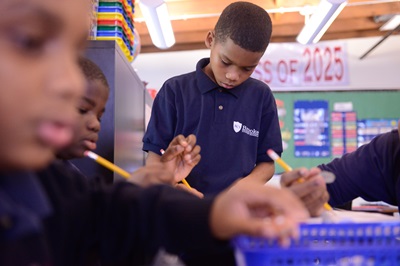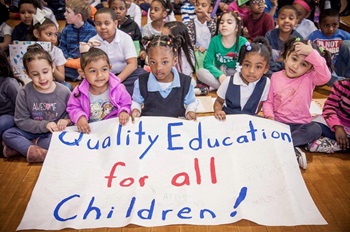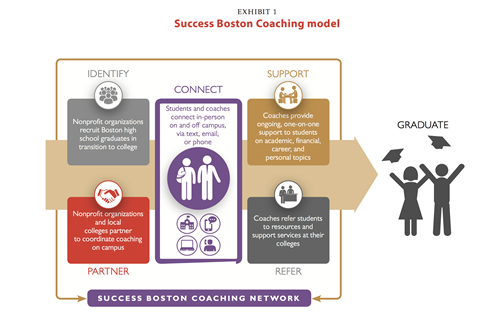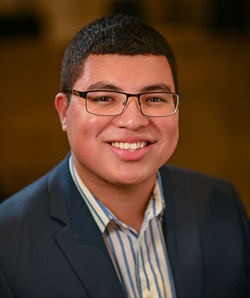
Education
Overview
Our Vision: All Greater Boston residents can access the education, training, and resources they will need to succeed in our regional economy.
At every stage Boston’s children will have access to high-quality education options, resources, and supports, beginning in early childhood and continuing through high school graduation and postsecondary education.
We will expand access to quality seats at every level, and will work with partners across sectors to help students complete postsecondary credentials and connect to high-growth careers.
Our strategy
Ensure all children in the Greater Boston area are prepared to thrive in school and life.
Ensure all students can access high-quality public schools that promote their academic achievement and prepare them for postsecondary success.
Increase postsecondary completion rates for Boston students through partnerships with local higher education institutions and community-based organizations, and strengthen and support community colleges in the state in realizing their full potential as important workforce development partners.
Strategy in Detail
Early Childhood
Vision: All children in the Greater Boston area are prepared to thrive in school and life.
Early childhood offers a critical early opportunity to launch young residents on a path to academic and life success. Efforts to support healthy development—from prenatal supports through access to high-quality pre-kindergarten and connections with K-12—will help to ensure that children arrive at school ready to thrive.
Our three primary areas of focus in the Early Childhood strategy are: pediatric parent engagement, high-quality pre-K, and supporting the early childhood ecosystem.
For an overview of the Boston Foundation’s Early Childhood strategy, click here.
Grantee Spotlight: Institute for Early Education Leadership and Innovation
The Leadership Institute is a university-wide initiative housed in the College of Education and Human Development at UMass Boston, which offers training in entrepreneurial leadership to frontline early educators and child care business owners serving young children with a focus on disadvantaged communities.
From Teddy Kokoros, Institute for Early Education Leadership and Innovation graduate:
“Graduating from UMass Boston as a lead pre-school teacher, I wanted to learn how to influence policy decisions related to early education and care. More often than not, important decisions in this field are made by people who don’t work with young children from birth to age five, and so I enrolled in the Post Master’s Certificate (PMC) program at UMass Boston’s Institute for Early Education Leadership and Innovation. The PMC program ultimately changed my career.
"Today, I’m working for the new Massachusetts StrongStart Professional Development Centers that will give early educators access to new training and education. The knowledge I gained also made me a more confident and effective advocate. In 2018, I launched Ideas and Innovations In Early Childhood Education and Care, which publishes news on research and innovation in early ed from the perspective of people who work directly with young children. I am also working on my PhD in Education from Lesley University. Going forward, my plan is to keep learning, collaborating, and advocating in early education to improve the quality of programs as well as the work conditions of those who care for and teach our youngest children.”
K-12
Vision: All students can access high-quality public schools that promote their academic achievement and prepare them for postsecondary success.
This strategy is informed by research and experience which suggest that when schools have autonomy, principals and teachers design learning that puts students at the center. We believe expansion of autonomy, or site-based decision making, helps to create conditions that promote students’ academic achievement and readiness for successful post-secondary pursuits.
Our work focuses on governance reform, systems change, and school redesign, including expanding autonomies to schools inside the school district, expanding or importing innovation within the Boston Public Schools, and advocating for policy changes that allow successful schools to proliferate.
The vast majority of our grant-making resources are devoted to supporting students who enroll in the Boston Public Schools. The annual Pozen Prize for Innovative Schools at the Boston Foundation recognizes autonomous schools that consistently boost students’ achievements through innovative models, programs and practices.
Grantee Spotlight: Grove Hall Alliance
The Grove Hall Alliance (GHA) is a network of five Boston Public Schools—Haynes Early Education Center, King K-8, Trotter K-8, Frederick Pilot Middle School, and Burke High School—seeking to create a K0-12 pathway for students and their families in the Greater Grove Hall neighborhood. The school leaders, all women of color, came together a few years ago to form the GHA with a passion and determination to create a coordinated, strategic response to the impact that profound neighborhood-based inequities have had on their students. The premise for their work is that stronger schools equal stronger neighborhoods and stronger neighborhoods equal stronger schools. Working together rather than in silos, GHA school leaders recognize that in order for their students to thrive there needs to be excellent teaching and learning in each school, and schools need to engage the community to address the most fundamental challenges their young people face.
College Completion
Vision: Increase postsecondary completion rates for Boston students through partnerships with local higher education institutions and community-based organizations, and strengthen and support community colleges in the state in realizing their full potential as important workforce development partners.
Now, more than ever, a credential beyond a high school diploma is required for individuals to access opportunity in our region.
Our primary investment is in Success Boston, our city’s college completion initiative, which strives to double the number of students who earn a post-secondary credential within six years of graduating from high school. Success Boston seeks to ensure that Boston public school graduates are getting ready, in, and through college, and connected to careers. In addition, we support our state’s public higher education system, including system reform efforts to strengthen community colleges and better connect these vital institutions to regional employers.
Grantee Spotlight: West End House Boys & Girls Club
The West End House Boys & Girls Club is a youth development community-based organization in the Allston-Brighton neighborhood of Boston which provides programming for young people ages 7-24. Though the majority of their youth come from Allston-Brighton, West End House serves young people from nearly every neighborhood in Boston. A long-time partner organization in the Success Boston initiative, West End House also provides coaching support through college to a diverse group of students, nearly half of whom are young men of color.
From a Success Boston student at West End House, Jose Mendoza:
"My name is Jose Mendoza, and I graduated from a BPS high school in 2016. As a first-generation college student, I never really knew nor understood the process of applying to college. I met my coach Morgan Bondy during my junior year of high school, who connected me with the West End House and Success Boston which has not only impacted me but has also impacted my family. In high school my Success Coach taught me about what a GPA, the SAT and ACT tests were - terminology that most first-generation college students and Latino males are not familiar with. Teaching me the basic college terminology allowed me to fully see a clearer view of the college process. Not only did Morgan help me apply to colleges, she also provided me with the guidance to understand my award letters. Analyzing financial aid letters was confusing but with the help of my coach I was able to decide to attend Lesley University and be part of the Urban Scholars Initiative program."





